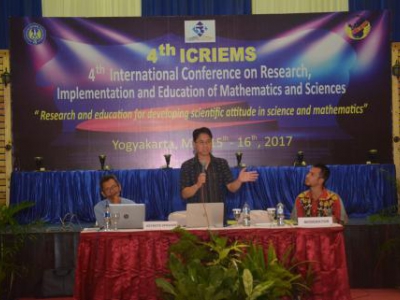FMS OF YSU ORGANIZED THE 4TH ICRIEMS

Faculty Of Mathematics And Natural Sciences of Yogyakarta State University organized the 4th International Conference on Research, Implementation and Education of Mathematics and Science (4th ICRIEMS) on Monday-Tuesday (15-16/5) at the auditorium of YSU and was opened by Vice Rector I, Dr. Margana. Also present Vice Rector IV, Dr. rer.nat Senam, and lecturers’ delegation from partner university, such as Univesiti Pendidikan Sultan Idris (UPSI) Malaysia, Yala Rajabhat University, etc.
In that occasion also present many speakers from various country, they were Assistant Prof. Maitree Inprasitha, Ph.D., from Faculty of Education, Khon Kaen University, Dr Liem Peng Hong from Nippon Advanced Information Service (NAIS Co., Inc.), Dr. Jean W. H. Yong from Plant Eco-Physiologist and IUCN Mangrove Red List coordinator, University of Western Australia and Curtin University, Perth, Australia, Associate Profesor Dr. Nor Azowa Ibrahim from Universiti Putra Malaysia, Assoc. Prof. Khajornsak Buaraphan, Ph. D from Mahidol University Thailand, and Prof. Dr. ZuhdanKunPrasetyo, M.Ed. from FMS of YSU.
Liem Peng Hong in his paper entitled Nuclear Energy Human Resource Development in Post Fukushima Dai-Ichi NPP Accident was presented, for more or less 30 years, from the end of 70’s until 2010, society polling that held by printed mass media and television showed that negative opinion concerned about nuclear power plant in Japan in average always below 40%. After the Fukushima accident, the same polling which was conducted from March 2011 until March 2012 showed that the negative opinion increased rapidly up to 70% 4-6 month since the accident. However, even after the accident happened, 60% society agreed that the existence of nuclear power plant in Japan indeed necessary although many people oppose the establishment of the new nuclear power plant. After the accident, the power plant policy in Japan based on approximation of demand and supply in the year 2030 recommend that the contribution nuclear power plant towards electricity in Japan must be reduced from around 30% (before the accident) into 20-22% in 2030. The void caused by this reduction diverted into another renewable energy source such as solar and wind.
“After that Fukushima accident, public and private universities have re-designed their curriculum for facing the issue and challenge that has been mentioned earlier. In this article discussed two examples that has been applied,” explained him.
The example is a curriculum that has been applied by Tokyo Institute of Technology for postgraduate students that majored power plant department. The changes of the curriculum resulted in the graduates who have advanced specialization in science and nuclear engineering, have wide insight and have high ethics and responsibility. The curriculum also allows the graduates to gain the ability to have a dialogue logically, problem-solving skills, and creativity through research in seminars and master's theses. Courses offered in this new curriculum covers: Nuclear Engineering, Nuclear Reactor Deactivation Engineering, Nuclear Fuel Cycle Engineering, Biology and Radiation Medicine, Nuclear Fusion Engineering/Accelerator, Advanced Nuclear Engineering, Internship and Research seminar.
Meanwhile, Prof. Maitree Insprasitha, Ph.D in the paper entitled An Open Approach Incorporating Lesson Study: An Innovation For Teaching Whole Number Arithmetices explained about the traditional approach in learning mathematics in Thailand along with the result that have been so far less than satisfactory. Moreover, he presented the analysis about the differences between text-book in Japan and Thailand along with the result for applying the innovative learning approach using Japanese text-book that are translated into Thailand.
Maitree give an example how grade one students of elementary school learn to gain meaningful understanding about integer arithmetic through mathematics activities taught by teachers using an open approach. After trying for decades, Thailand as a developing country which are adapt ideas from developed country, finally able to overcome one prolonged problem in learning mathematics, in particular for integer arithmetic in elementary schools. Mathematics in school has been changed from passive learning into active learning, where students engage in more meaningful mathematics activities. (witono)

